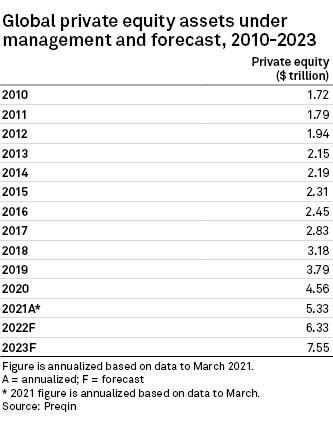S&P Global Offerings
Featured Topics
Featured Products
Events
S&P Global Offerings
Featured Topics
Featured Products
Events
S&P Global Offerings
Featured Topics
Featured Products
Events
Banking & Capital Markets
Economy & Finance
Energy Transition & Sustainability
Technology & Innovation
Podcasts & Newsletters
Banking & Capital Markets
Economy & Finance
Energy Transition & Sustainability
Technology & Innovation
Podcasts & Newsletters
S&P Global Offerings
Featured Topics
Featured Products
Events
14 Jan, 2022

By Dylan Thomas
AUM in the global alternatives industry is expected to nearly double over the next five years, swelling to $23.21 trillion by 2026 from an estimated $13.32 trillion at the end of 2021 — growth a bullish new report from Preqin predicts will be fueled in large part by private equity.
Private equity, coupled with venture capital, "should be by far the largest of the alternative asset classes" in 2026, said Dave Lowery, a senior vice president and head of research insights for Preqin. Global AUM for the asset class is forecast to increase to $11.12 trillion in 2026 from an estimated $5.33 trillion at the end of 2021, he said.
"To put that into context, that's more than twice the size of the hedge fund industry, which we forecast to hit $5.4 trillion AUM and be the next-biggest asset class" in 2026, Lowery said Wednesday in a briefing on the firm's outlook for the rest of the year and beyond.

The accelerating "retailization of alternative assets" is one trend Preqin CEO Christoph Knaack predicted would drive private equity growth over the next half-decade as the industry opens itself to a wider pool of investors.
Contributions from high net worth individuals, wealth managers and retail investors already account for about 5%, or roughly $750 billion, of the industry’s global AUM, according to Preqin estimates; that is expected to grow as regulatory changes and advancements in investor education and technology lower barriers to entry.
"We don't expect that retailization to happen overnight. It will be a rather slow process that will take a couple of years. But we do believe this trend will hugely impact the alternatives industry and change it for the better," Knaack said.
Risks on the horizon
It was a year of all-time highs for private equity. A surge in deal-making drove global private equity deal value to a total of $603 billion as of October 2021, or $804 billion on an annualized basis, which Preqin notes would surpass a record the industry set in 2007. Private equity's global dry powder, or uninvested capital, stood at a record $1.3 trillion as of September 2021, according to Preqin.
Fundraising rose 12% year over year to $622 billion in 2021 after a drop of 11% in 2020, and it is expected to remain on a steady, if slowing, growth track over the next five years, according to Preqin. The firm targeted a 2022 global fundraising total of $645 billion in its report, an increase of about 4% over 2021.
While Preqin maintains a positive outlook for 2022, it also highlights "early signs" the 2021 surge in private equity activity may be waning, noting that both fundraising and exit activity appeared to slow in the third quarter of last year. And, going forward, inflation is a key risk.
The report ties inflation to "excessive stimulus and stubborn supply-chain disruptions," noting that some of the factors currently driving inflation should fade. It goes on to state there is a risk that inflation pushes long-term interest rates higher, which could drag down private equity deal-making by raising the cost of financing leveraged buyouts or by slashing the profit margins for portfolio companies and cutting into today's relatively high valuations.
Knaack is also watching how environmental, social and governance practices can potentially shape the industry. "Across private markets, we are at the early stages of an ESG wave," he said.
However, there is a mismatch between increasing investor demand for responsible investing and the current dearth of reliable ESG data, according to the report. In a November 2021 survey by Preqin, 67% of private equity fund managers cited a "lack of quality/consistent ESG data" as the main challenge in ESG policy implementation.
